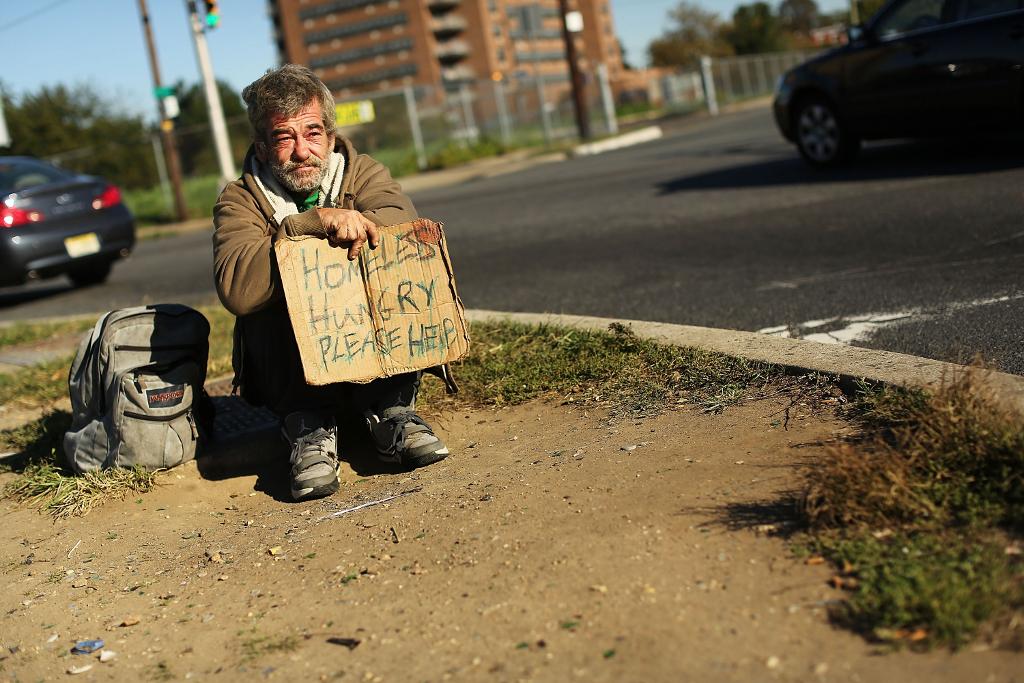Combating diseases of poverty requires joint US-Middle East effort
A homeless man named Bob waits for donations from passing motorists on October 11, 2012 in Camden, New Jersey. According to the U.S. Census Bureau, Camden, New Jersey is now the most impoverished city in the United States with nearly 32,000 of Camden’s residents living below the poverty line.
HOUSTON — Profound poverty promotes both conflict and disease. Today, an estimated 200 million people living in the Middle East and neighboring Pakistan – one third of the total population of these areas — survive on less than $2 per day.
It may come as a surprise to many that almost 4 million Americans live at a similar level of poverty. New evidence indicates that the extremely poor people in the United States and the Middle East and Pakistan suffer from some of the same neglected tropical diseases. These include murine typhus which is transmitted by fleas from rats; brucellosis, caused by unsterilized milk or meat from infected animals; leishmaniasis, spread by the bite of the sandfly; toxocariasis, caused by the larvae of worms; and the arboviral infections caused by dengue and West Nile virus, which disproportionately affect people who live in severe poverty.
Relieving the burden of tropical diseases shared by the poor in the United States, the Middle East, and Pakistan through vaccines and other biotechnologies could help bring our worlds together through scientific cooperation.
Despite their advanced technological capabilities, the Middle Eastern countries and Pakistan have little capacity for developing and manufacturing new vaccines. Nations such as Egypt, Iran and Pakistan would benefit greatly from collaborations with US vaccine scientists and institutes to expand the region’s vaccine pipeline. Together, we could exploit cutting edge technologies to produce a new generation of vaccines to prevent neglected tropical diseases. For instance, new joint development projects for manufacturing and clinically testing leishmaniasis and arbovirus vaccines could begin immediately, together with programs of scientific exchange and training.
Meanwhile, recent reports from the Middle East suggest that a respiratory illness resembling SARS (severe acute respiratory syndrome) may have emerged, so that this and other viral infections could pose a threat to the entire region, especially in the days and weeks following the recently ended Hajj. Joint U.S.-Middle-Eastern cooperation could facilitate the development and stockpiling of antiviral vaccines.
Engaging these nations in science diplomacy will not be easy. Although Iran has bona- fide vaccine development capabilities, it has no formal diplomatic ties with the United States. Nearby, Pakistan has excellent scientific research institutes and universities, including the International Center for Chemical and Biological Sciences at the University of Karachi and the National Institute for Biotechnology & Genetic Engineering in Faisalabadi – both of which could become vaccine research hubs.
Diplomatic strain between the United States and Pakistan makes collaboration difficult, as does indigenous mistrust of vaccines and western medicine. Vaccination rates in Pakistan are low for a variety of reasons – both cultural and structural in the program itself. Yet we should pursue these possibilities in the name of science and humanity. Louis Pasteur, who developed the first vaccine for rabies and other diseases, once proclaimed, “Science knows no country.” It was in that spirit that the oral polio vaccine was developed jointly by American and Soviet scientists in the late 1950s, at the height of the Cold War.
While the hurdles are formidable, some Middle Eastern and Pakistani scientists have a great interest in collaborating with US institutions in vaccine development. We want to collaborate with these vaccinologists in a free and open manner. Because we would proceed only with the explicit endorsement of the US and Middle Eastern governments, we need the assistance of the State Department to facilitate essential links, communications and documents.
If the United States and the Soviet Union could cooperate on a polio vaccine during the Cold War, surely scientists in the United States and Middle East and Pakistan can do the same. Now is the time to engage in scientific diplomacy to produce a new generation of life-saving vaccines. Such diplomacy goes beyond political borders.
Peter Hotez is professor of pediatrics and dean of the National School of Tropical Medicine at Baylor College of Medicine, Baker Institute Fellow in Disease and Poverty at Rice University. He is president of the Sabin Vaccine Institute and Director of the Sabin Vaccine Institute and Texas Children’s Hospital Center for Vaccine Development
We want to hear your feedback so we can keep improving our website, theworld.org. Please fill out this quick survey and let us know your thoughts (your answers will be anonymous). Thanks for your time!
